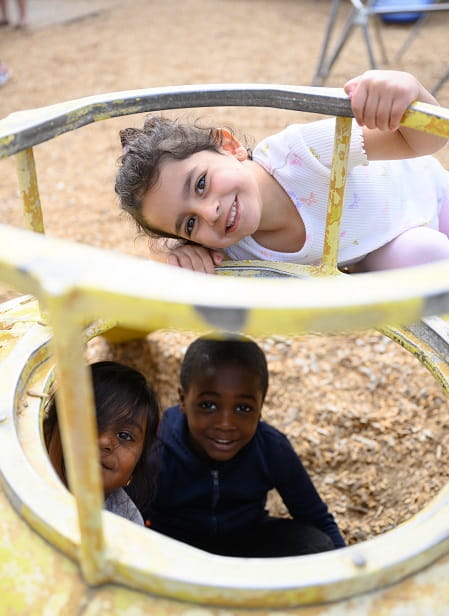Maria Montessori (2019, 72) once said, “A child’s needs are simple and a happy childhood needs only simple surroundings.” Sounds easy, right?
Much like parents, educators want the children they guide to be healthy and happy. As Dr. Montessori alluded to, it can be very simple to help children cultivate happiness.
Here are 8 ways to help children cultivate happiness:
Foster strong social connections.
Children with strong friendships and relationships are more likely to experience positive emotions. Although peer relationships often come with challenges and disagreements, these shared experiences create a sense of safety, belonging, and purpose.
Model grace and courtesy.
Being kind to others naturally improves one’s mood. Demonstrating kindness encourages children to engage in random acts of kindness themselves.
Introduce and practice mindfulness.
Mindfulness is the ability to be fully present. Model for children what it looks like to pause and appreciate the moment. Invite children to pay attention to what is happening; what they are feeling, hearing, seeing, or anything else they notice. Try leading a guided meditation as a classroom community or read a simple meditation together as a class.
Lead an appreciation practice.
Gratitude promotes happiness. Work with students to express what each person is grateful for such as a loving family, helpful friends, or completing a large work. Practice taking turns at a community meeting allowing each child to share their gratitude. Provide opportunities for children to write thank you cards. Helping children recognize that they can feel disappointed and grateful simultaneously can increase feelings of happiness as well.
Set goals.
Having goals helps children to feel motivated. This motivation creates a sense of purpose that helps foster happiness. Help students to set short-term and long-term goals. Support them in identifying steps to achieve their goals; encourage them to visualize this process. Check in with them along the way during individual meetings to assess their progress and offer help when needed.
 Provide opportunities for movement.
Provide opportunities for movement.
Physical activity has been shown to be directly related to happiness. Ensure that students are able to enjoy recess, physical education classes, and movement breaks in the classroom. Preparing an outdoor environment where students are able to get a bit of fresh air and experience some additional freedom of movement during the work cycle can also be helpful.
Have a sense of humor.
Research indicates that smiling and laughing release endorphins that elevate mood. These actions cause a chemical reaction in the brain that fosters happiness. Tell a joke or read a funny story. Encourage students to do something that makes someone else smile and it will help improve their mood, too.
Help children identify and pursue their interests.
Help children find their interests and encourage them to pursue them. When children are engaged in activities they enjoy, they are able to remain present.
Finally, as Dr. Montessori reminds us, “The child who concentrates is immensely happy.” As a guide, create opportunities for children to connect with the prepared environment in meaningful, purposeful ways that foster a sense of deep concentration. It is here where children will find true happiness!


